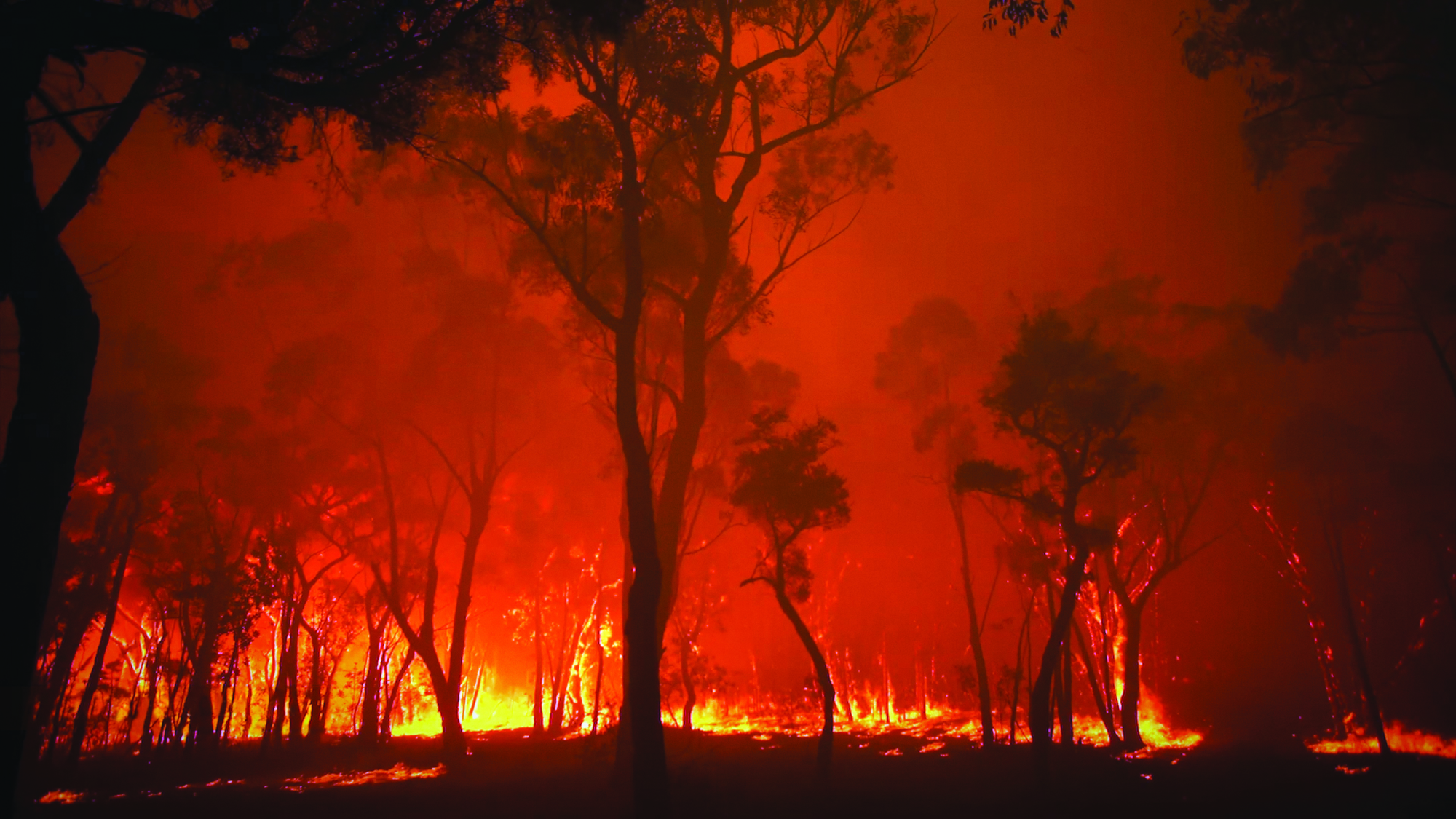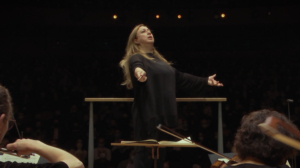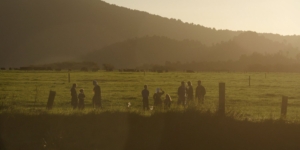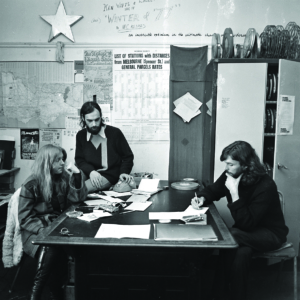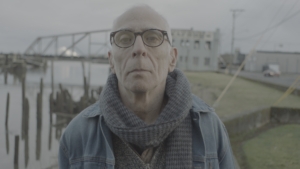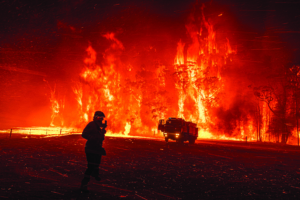It’s almost too easy to forget, after nearly two years of suffering rolling punches from the pandemic, just how much momentum there was behind the desperate battle to reverse Australia’s climate obstructionism heading into the summer of 2019/20. The opening sequence of Los Angeles–based, Melbourne-raised documentary maker Eva Orner’s latest impassioned piece of essay filmmaking, Burning (2021) – shot across the space of two months while Australia was ablaze – viscerally thrusts the viewer back into the hopeful throng of what could have been.
The documentary begins with an aerial shot of The Domain in Sydney, where a sea of fired-up students have assembled, standing shoulder to shoulder to demand immediate action on Australia’s impending climate disaster and the sacking of Prime Minister Scott Morrison[1]See Natassia Chrysanthos, ‘“We Will Never Back Down”: 80,000 Strike in Sydney over Climate Change’, The Sydney Morning Herald, 20 September 2019, <https://www.smh.com.au/national/nsw/we-will-never-back-down-80-000-strike-in-sydney-over-climate-change-20190920-p52tet.html>, accessed 29 October 2021. – a surreal sight from the vantage point of our socially distant times. Footage of a First Nations man playing a didgeridoo on stage is followed by that of young activist Daisy Jeffrey addressing the crowd. This juxtaposition is a reminder of the country’s longstanding political inaction on climate change,[2]See Anne Davies, ‘Cabinet Papers: Keating MPs Considered Carbon Tax to Tackle Climate Change’, The Guardian, 1 January 2018, <https://www.theguardian.com/australia-news/2018/jan/01/cabinet-papers-keating-mps-considered-carbon-tax-to-tackle-climate-change>, accessed 4 November 2021. and of two particular groups whose voices are not being heeded: the traditional custodians of this land, whose ancestors cared for it through an innate connection and understanding for thousands of years; and our determined youth – the very people who will inherit our dangerously warming continent long after our current crop of intransigent politicians are gone.
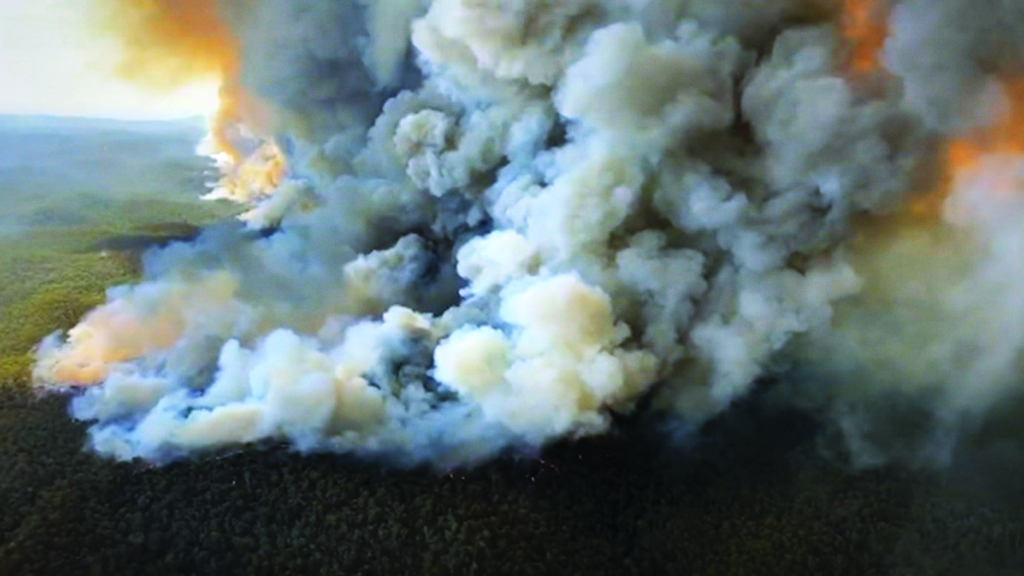
Jeffrey – an impressive figure in the mould of Greta Thunberg who has already authored a book on climate activism, On Hope[3]Daisy Jeffrey, On Hope, Hachette, UK, 2020. – was politically active before her journalist father James decamped to the Canberra bubble to join Leader of the Opposition Anthony Albanese’s speechwriting team,[4]See Amanda Meade, ‘James Jeffrey Resigns from The Australian to Join Anthony Albanese’s Staff’, The Guardian, 25 June 2019, <https://www.theguardian.com/media/2019/jun/25/james-jeffrey-resigns-from-the-australian-to-join-anthony-albaneses-staff>, accessed 4 November 2021. but you can see the shape of a future leader in her. And yet, as Jeffrey makes clear in Burning, she really shouldn’t have to be leading the conversation. As Orner says:
That moment where Daisy says she’s not even sure if she wants to have kids […] She shouldn’t have to be dealing with that. We didn’t have to deal with that. And it kind of broke my heart. You know, she’s so smart and brave and precocious and adorable. And it’s like, give this kid a break. As she says, ‘We just want to focus on our next identity crisis.’ And these poor kids are having to save the world, literally.
It’s a powerful moment in a bracing film. From its initial protest sequence, Burning fields horrific footage emanating from Black Summer, using archival and amateur-shot videos of bushfires ripping through forests and townships as well as the devastating aftermath of charred expanses and injured or dead animals. But Orner’s documentary is not just a catalogue of harrowing images; it also examines the Australian Government’s history of negligence. News clippings dating back to the 1980s detail how early warnings were ignored by successive leaders, and how the Labor Party’s attempts to change course under prime ministers Kevin Rudd and Julia Gillard were undone. A range of figures, including former New South Wales fire chief Greg Mullins and environmental scientist Tim Flannery, also help to explain how we got to this point. And while this is all sobering stuff, it ends on a hopeful note: with Jeffrey and her fellow young activists expressing their dedication to ensuring that this urgent issue remains front of mind.
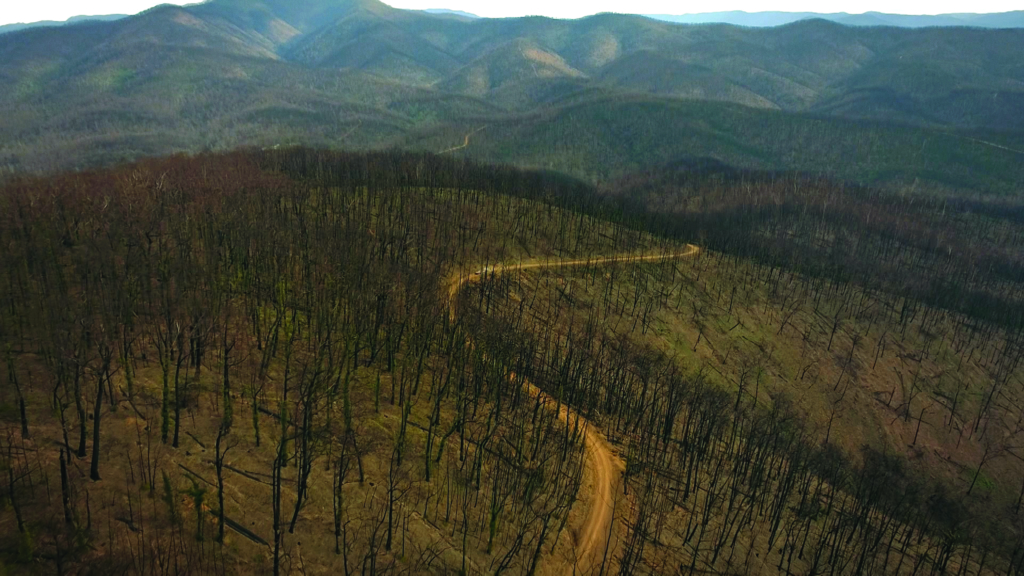
Ticking time bomb
It is not alarmist to talk about the risk of climate change as representing the end of the world as we know it. The devastating, apocalyptic images that emerged over the course of Black Summer – of charred corpses of kangaroos, and of Mallacoota residents huddling on beaches under a blood-red sky[5]See Helen Davidson, ‘Mallacoota Fire: Images of “Mayhem” and “Armageddon” as Bushfires Rage’, The Guardian, 31 December 2019, <https://www.theguardian.com/australia-news/2019/dec/31/mallacoota-fire-mayhem-armageddon-bushfires-rage-victoria-east-gippsland>, accessed 29 October 2021. – underlined our national as well as global predicament. With time running out for meaningful change, the deliberate refusal of our politicians to listen to stark warnings made the losses all the more horrific.
Days before I spoke with Orner, Morrison had finally committed to a target of net zero carbon emissions in Australia by 2050, and was about to depart for the United Nations Climate Change Conference (COP26) in Glasgow.[6]See Sarah Martin, ‘Australia Commits to 2050 Net Zero Emissions Plan but with No Detail and No Modelling’, The Guardian, 26 October 2021, <https://www.theguardian.com/australia-news/2021/oct/26/scott-morrison-says-australia-2050-net-zero-emissions-plan-based-on-choices-not-mandates>, accessed 29 October 2021. Orner, who headed there alongside Jeffrey, was unconvinced by Morrison’s detail-deficient and, in places, quite fanciful ‘plan’. The biggest failing of the marketing spin contained within the government’s superficial brochure,[7]Commonwealth of Australia, Australia’s Long-term Emissions Reduction Plan: A Whole-of-economy Plan to Achieve Net Zero Emissions by 2050, 2021, <https://www.industry.gov.au/sites/default/files/October%202021/document/australias-long-term-emissions-reduction-plan.pdf>, accessed 4 November 2021. relying in part on yet-to-be-invented technology,[8]ibid. is that 2050 as a goal is, in itself, way too late. Orner stresses, ‘2050 is really important, but 2030 is more important, and Morrison has just kicked that to the wind. He doesn’t give a shit.’
She is troubled by how many voters appear easily bamboozled by the Prime Minister’s marketing spin, and fears the next federal election in Australia may reinstall his government:
Bottom line is: our 2030 targets are woeful, and would mean that, by the end of the century, we would have a temperature rise of about 4 degrees, which is beyond catastrophic […] There’s no plan to get us there. It’s just words. They’re still pushing gas, not shutting down mines and not pushing for renewables. And we don’t know what garbage [Deputy Prime Minister] Barnaby Joyce has negotiated. It’s also hidden.
In Burning, Jeffrey speaks of her disillusionment with the previous United Nations Climate Change Conference, held in Madrid in December 2019.[9]See ‘Climate Activist Disappointed with Lack of Urgency at COP25’, ABC NewsRadio, 16 December 2019, <https://www.abc.net.au/radio/newsradio/climate-activist-disappointed-with-lack-of-urgency/11802070>, accessed 29 October 2021. Fossil-fuel lobbyists moved easily among world leaders while activists like her were shut out of proceedings. Those very companies polluting our world were also sponsors. And she was less than impressed with energy minister Angus Taylor’s parroting of platitudes about ‘meeting and beating’ previous commitments,[10]See, for example, ‘Australia Committed to Successful COP26 Summit in Glasgow’, media release, Angus Taylor MP website, 28 October 2021, <https://www.minister.industry.gov.au/ministers/taylor/media-releases/australia-committed-successful-cop26-summit-glasgow>, accessed 4 November 2021. again with little detail on the how of the matter. Orner fully shares her scepticism:
I’ve been talking to some politicians, and I think to be a politician you have to be an optimist, which on some levels is kind of being a liar in this situation. I’m not a pessimist. But I’m a realist. And it’s looking really bad.
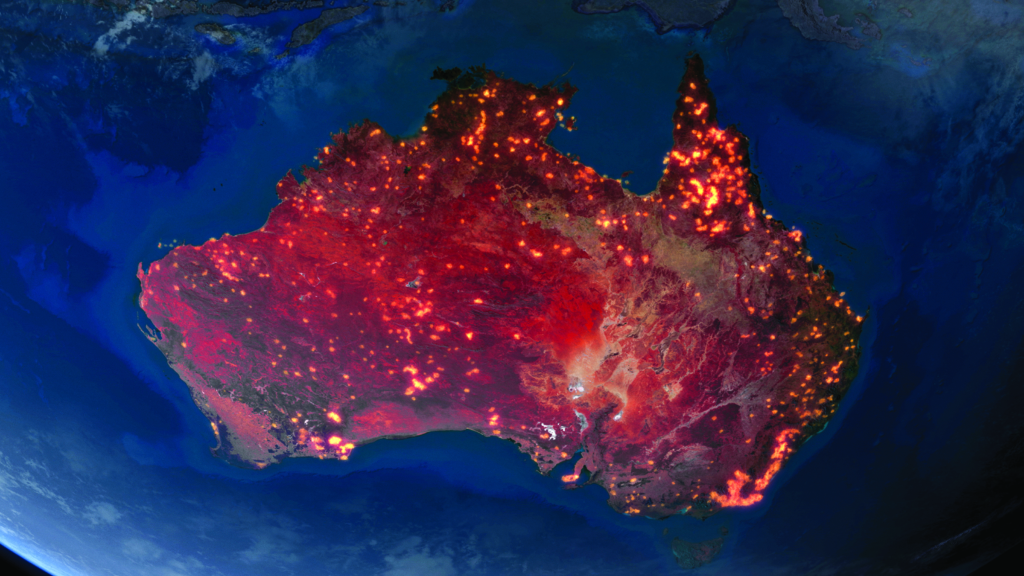
Holding out for a hero
For all its siren call about the nation sleepwalking into disaster, there is optimism in Burning. Two of the film’s most sobering but hopeful voices belong to Mullins and Flannery. The latter, a professor at the University of Melbourne’s Melbourne Sustainable Society Institute, was the inaugural chief commissioner of the Climate Commission, a body set up to offer ‘a reliable, apolitical source of facts on all aspects of climate change’[11]Tim Flannery, quoted in Tom Arup, ‘Abbott Shuts Down Climate Commission’, The Age, 19 September 2013, <https://www.theage.com.au/politics/federal/abbott-shuts-down-climate-commission-20130919-2u185.html>, accessed 4 November 2021. – until, that is, former prime minister Tony Abbott abolished the commission as one of his first acts in government.[12]Arup, ibid.
Orner holds faith in both. ‘I’m such a fan of people like Greg and Tim who have been doing this for thirty years,’ she says, referring to their ongoing commitment to pushing government to mitigate against the worst effects of climate change. The former becomes quite emotional in the film when he first speaks of the rapidly shifting weather patterns in New South Wales over his lifetime, and then of the firefighter lives lost during Black Summer. ‘He’s a real hero, and what does he get? He gets bashed by the Murdoch press and ignored by the government,’ Orner says of Mullins’ efforts in assembling a team of fire chiefs to warn about the clear and present danger going into that fateful fire season. ‘I love Greg’s optimism and his fire,’ she says. ‘He’s like, “We can do this,” and Tim’s the same. They don’t give up. They are national treasures.’
The film highlights both men’s thwarted attempts to sound the alarm, pointing in particular to Flannery’s frustration at the difference a few months made to Morrison’s resolve when faced by the encroaching pandemic. As Orner puts it:
We made a point to praise Scott Morrison’s initial handling of COVID. I love that part in the film where Tim Flannery says, ‘He listened to the science.’ He declared a pandemic before the World Health Organization [did].
Orner points to the debacle of Australia’s belated vaccine rollout[13]See ‘What’s Gone Wrong with Australia’s Vaccine Rollout?’, BBC News, 17 June 2021, <https://www.bbc.com/news/world-australia-56825920>, accessed 4 November 2021. as evidence that this foresight was short-lived, and remains unconvinced that Morrison’s deference to scientific consensus will stick as we move sluggishly and almost imperceptibly towards net zero. ‘Everyone was on the edge of their seat saying, “He’s gonna do something meaningful about climate change,”’ she recalls of that hellishly hot summer during which Burning was filmed. As we moved into autumn and the pandemic crashed into the country, however, some of that momentum was lost. As Orner puts it:
It’s this existential question about humanity. It’s so shocking to me that at this point now – where the science is irrefutable – the world can’t get together and say, ‘Let’s switch from fossil fuels. Let’s do renewable energy. It will be a huge economic boom for everyone if we retrain people.’ And we just won’t do it. It’s baffling.
Baffling to a point – but, as she and the film readily address, fossil-fuel lobbyists and their wallets underpin so many of these uncannily awful decisions.
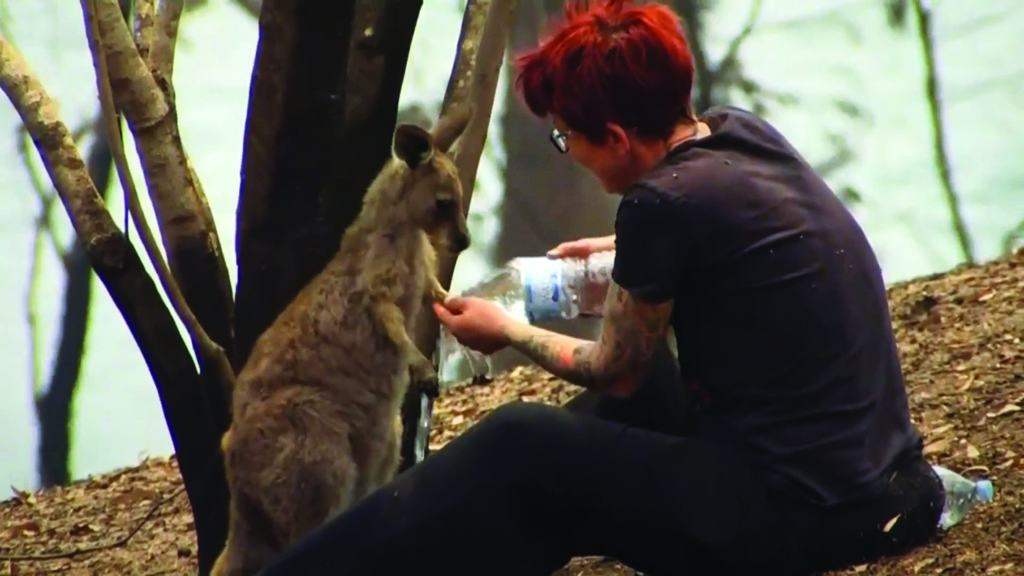
Home truths
Oscar winner Orner has been in Los Angeles for some fifteen years now, yet Burning is one of two powerful documentaries shot during that time that focus on shameful Australian stories. The other is Chasing Asylum (2016), which shines a light on the darkness of Australia’s inhumane treatment of asylum seekers and refugees, particularly in terms of its offshore-detention policies.[14]Chasing Asylum can be viewed through DocPlay. See <https://www.docplay.com/shows/chasing-asylum>, accessed 4 November 2021. For more on the film, see Hanna Schenkel, ‘Bloody Un-Australian: Eva Orner’s Chasing Asylum’, Metro, no. 190, Spring 2016, pp. 74–9. Then–prime minister John Howard’s cruel handling of 400 asylum seekers aboard a Norwegian container ship in 2001, eponymously dubbed the Tampa affair,[15]See Kirsti Melville & Anna Kelsey-Sugg, ‘The Tampa Affair Shocked the World. Twenty Years On, Those Involved Tell Their Stories’, The History Listen, Radio National, 26 August 2021, <https://www.abc.net.au/news/2021-08-26/tampa-twenty-years-australia-immigration-asylum-seekers-policy/100405158>, accessed 29 October 2021. was one of the deciding factors for Orner in leaving Australia. The failed republic campaign in 1999 was another. ‘I was around thirty, and it was such a time of momentum,’ she recalls of the hopeful lead-up to the referendum, which had shades of Jeffrey and her peers’ experience of COP25.
It was young people getting involved in politics for the first time in my life. Everyone was on the bandwagon […] It was a given that it was going to happen, and it didn’t. And I was like, ‘Huh, I don’t know this country. I got it wrong.’ And ever since, I feel like we’ve never gotten it back.
Of course, while there is local specificity in both these documentaries, these stories nonetheless hold huge global relevance. ‘Maybe it takes being out of the country to realise how much you love it, and also to see when it goes off course [more clearly],’ Orner suggests. That simultaneous connection and distance enables her to be frank about the country’s more depressing aspects:
People generally think Australia is cool and pretty progressive, and I’m trying to say to the world, ‘Just because we’re nice and we have great beaches, don’t let that fool you. We’re a very conservative country, and we shouldn’t be.’
Fearing we are ‘heading towards the dark ages’, she hopes it’s not too late to change course. While she agrees with Jeffrey that we should not be leaning on high school students to fix our mess, there’s no denying that the young activist is a powerful voice that binds Burning’s key themes together. Orner says of her choice to bookend the documentary with her,
[The film is] not character-based. It’s more essayistic, which is really hard to do as a filmmaker. It’s much easier to follow someone’s story. Essays are hard to build out, especially when they’re about complicated subjects. So it’s about making her story continuous.
And does Orner still have hope we can make a difference? As she packs her bags for COP26 while California also burns,[16]See ‘More than 1,000 Firefighters Battle Blaze Spreading Along California Coast’, The Guardian, 14 October 2021, <https://www.theguardian.com/world/2021/oct/13/alisal-fire-firefighters-spreading-california-coast>, accessed 4 November 2021. she notes, archly, that it’s maybe best not to rely on her judgement. ‘Without really realising it, I’ve chosen two of the most climate change–affected places to live. Which doesn’t say a lot about my intelligence.’ She’s joking, of course, but it’s clear from her impressive body of work that nothing could be further from the truth. Apart from, perhaps, our politicians.
Endnotes
| 1 | See Natassia Chrysanthos, ‘“We Will Never Back Down”: 80,000 Strike in Sydney over Climate Change’, The Sydney Morning Herald, 20 September 2019, <https://www.smh.com.au/national/nsw/we-will-never-back-down-80-000-strike-in-sydney-over-climate-change-20190920-p52tet.html>, accessed 29 October 2021. |
|---|---|
| 2 | See Anne Davies, ‘Cabinet Papers: Keating MPs Considered Carbon Tax to Tackle Climate Change’, The Guardian, 1 January 2018, <https://www.theguardian.com/australia-news/2018/jan/01/cabinet-papers-keating-mps-considered-carbon-tax-to-tackle-climate-change>, accessed 4 November 2021. |
| 3 | Daisy Jeffrey, On Hope, Hachette, UK, 2020. |
| 4 | See Amanda Meade, ‘James Jeffrey Resigns from The Australian to Join Anthony Albanese’s Staff’, The Guardian, 25 June 2019, <https://www.theguardian.com/media/2019/jun/25/james-jeffrey-resigns-from-the-australian-to-join-anthony-albaneses-staff>, accessed 4 November 2021. |
| 5 | See Helen Davidson, ‘Mallacoota Fire: Images of “Mayhem” and “Armageddon” as Bushfires Rage’, The Guardian, 31 December 2019, <https://www.theguardian.com/australia-news/2019/dec/31/mallacoota-fire-mayhem-armageddon-bushfires-rage-victoria-east-gippsland>, accessed 29 October 2021. |
| 6 | See Sarah Martin, ‘Australia Commits to 2050 Net Zero Emissions Plan but with No Detail and No Modelling’, The Guardian, 26 October 2021, <https://www.theguardian.com/australia-news/2021/oct/26/scott-morrison-says-australia-2050-net-zero-emissions-plan-based-on-choices-not-mandates>, accessed 29 October 2021. |
| 7 | Commonwealth of Australia, Australia’s Long-term Emissions Reduction Plan: A Whole-of-economy Plan to Achieve Net Zero Emissions by 2050, 2021, <https://www.industry.gov.au/sites/default/files/October%202021/document/australias-long-term-emissions-reduction-plan.pdf>, accessed 4 November 2021. |
| 8 | ibid. |
| 9 | See ‘Climate Activist Disappointed with Lack of Urgency at COP25’, ABC NewsRadio, 16 December 2019, <https://www.abc.net.au/radio/newsradio/climate-activist-disappointed-with-lack-of-urgency/11802070>, accessed 29 October 2021. |
| 10 | See, for example, ‘Australia Committed to Successful COP26 Summit in Glasgow’, media release, Angus Taylor MP website, 28 October 2021, <https://www.minister.industry.gov.au/ministers/taylor/media-releases/australia-committed-successful-cop26-summit-glasgow>, accessed 4 November 2021. |
| 11 | Tim Flannery, quoted in Tom Arup, ‘Abbott Shuts Down Climate Commission’, The Age, 19 September 2013, <https://www.theage.com.au/politics/federal/abbott-shuts-down-climate-commission-20130919-2u185.html>, accessed 4 November 2021. |
| 12 | Arup, ibid. |
| 13 | See ‘What’s Gone Wrong with Australia’s Vaccine Rollout?’, BBC News, 17 June 2021, <https://www.bbc.com/news/world-australia-56825920>, accessed 4 November 2021. |
| 14 | Chasing Asylum can be viewed through DocPlay. See <https://www.docplay.com/shows/chasing-asylum>, accessed 4 November 2021. For more on the film, see Hanna Schenkel, ‘Bloody Un-Australian: Eva Orner’s Chasing Asylum’, Metro, no. 190, Spring 2016, pp. 74–9. |
| 15 | See Kirsti Melville & Anna Kelsey-Sugg, ‘The Tampa Affair Shocked the World. Twenty Years On, Those Involved Tell Their Stories’, The History Listen, Radio National, 26 August 2021, <https://www.abc.net.au/news/2021-08-26/tampa-twenty-years-australia-immigration-asylum-seekers-policy/100405158>, accessed 29 October 2021. |
| 16 | See ‘More than 1,000 Firefighters Battle Blaze Spreading Along California Coast’, The Guardian, 14 October 2021, <https://www.theguardian.com/world/2021/oct/13/alisal-fire-firefighters-spreading-california-coast>, accessed 4 November 2021. |
